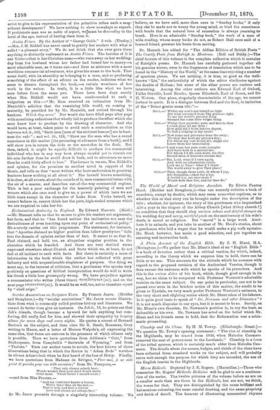Secular Annotations on Scr4rture Texts. By Francis Jacox. (Hodder and
Stoughton.)—By "secular annotations" Mr. Jacox means illustra- tions from what is commonly called profane history and literature. We cannot do better than give an instance. On Job ii., 13, he points out that Job's friends, though become a byword for talk anything but com- forting, did really feel for him, and showed their sympathy by keeping silence for seven days and seven nights. He quotes a sonnet of Bernard Barton's on the subject, and then cites Sir R. Steele, Rousseau, Gray writing to Mason, and a letter of Horace Walpole's, all expressing the same idea, that there are sorrows in the presence of which silence only is possible. Then we have quotations from Addison's "Cato," from Shakespeare, from Campbell's " Gertrude of Wyoming," and from "Malabo." Then our author turns to novels, the best kriown of these illustrations being that in which the Rector in "Adam Bode" watches in silence Adam's look when he first heard of the loss of Betty. Finally, we have quotations from Madame de Sdvign6, "Pour moi, je ne sais point de paroles pour une telle occasion ;" from Mr. Tennyson,— " That only silence suiteth best ; Words weaker than your grief would make Grief more. 'Twere better I should cease ;" - —and from Miss Procter,— " And my comforter knows a lesson, Wiser, truer than all the rest:— That to help and heal a sorrow Love and silence are always best."
So Mr. Jaws proceeds through a singularly interesting volume. We believe, as we have said, more than once in "Sunday books," if only they can be made not to weary the young mind, or bind the conscience- with bonds that the natural love of recreation is always yearning to break. Here is an admirable "Sunday book," the work of a man of wide reading, whose many books do not, as Robert Hall once said of a learned friend, prevent his brain from moving.


































 Previous page
Previous page